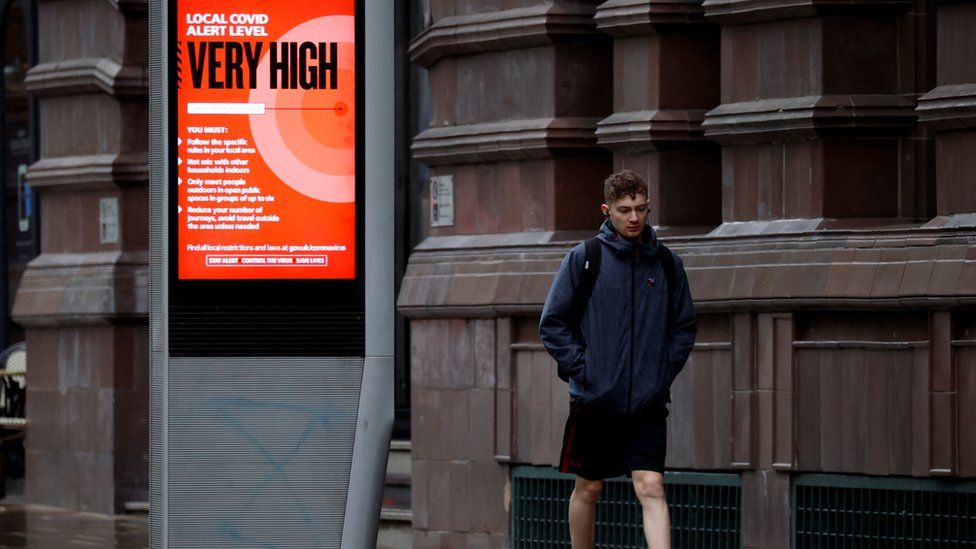Covid-19: England and Wales begin tougher rules for millions
- Published

Stricter coronavirus rules are coming into force for nearly six million Britons.
Greater Manchester's population of 2.8 million joined Liverpool City Region and Lancashire in England's highest tier of restrictions at midnight.
And from 18:00 BST, the 3.1 million people in Wales will have to stay at home as a 17-day lockdown begins.
It comes as a minister said there was a "common purpose here to get the virus down" so people could enjoy Christmas.
"I think few people expect it to be exactly as it would normally," said Chief Secretary to the Treasury Stephen Barclay - but "the ability of families to spend Christmas together" was "something we all hope to be in a position to do".
Welsh health minister Vaughan Gething said the lockdown in Wales was happening now so "we can have a much more normal Christmas season for businesses".
The UK recorded another 189 deaths and 21,242 new confirmed cases on Thursday.
Warrington has become the latest place to be placed into tier three - or "very high" alert level. The measures will take effect next week.
Nottingham and parts of Nottinghamshire are also expected to be moved into tier three next week, with the finer details such as whether or not gyms can stay open still to be decided as talks continue.
The tier three alert level means people cannot mix with other households and pubs and bars will be closed - unless they are serving substantial meals. Some areas in the top tier have also gone further, closing businesses such as bingo halls, casinos, betting shops and soft play centres.
Households are banned from mixing outdoors in private gardens or anywhere inside and people are advised against travelling into or out of the area.
South Yorkshire will also move into tier three restrictions from 00:01 on Saturday, by which time more than seven million people will be living under England's tightest rules.
Rising infections mean that Coventry, Stoke and Slough will move into tier two restrictions at 00:01 on Saturday.
The "high" alert level means households are banned from mixing indoors and people are encouraged to reduce their use of public transport.
In Wales, the "firebreak" means people are being ordered to stay at home and pubs, restaurants, hotels and non-essential shops will close until 9 November.
Supermarkets have been told not to sell items such as clothes, as First Minister Mark Drakeford said it would be "made clear" they should only open the parts of their business that sell essential goods.
Mixed views on the firebreak in Wales' first local lockdown area
And the Scottish government is to set out its own tiered alert system of Covid restrictions, which will come into force from 2 November.
First Minister Nicola Sturgeon said it would have five tiers, with the middle tiers corresponding roughly to England's three, plus a lower tier that is "the closest to normality" possible without a vaccine.
She said an additional top tier would be "closer to a full lockdown" - and was added because England's chief medical officer had acknowledged tier three restrictions were not necessarily enough to reduce infections in all circumstances.
- LOCKDOWN LOOK-UP: The rules in your area
- THREE TIERS: How will the system work?
- PAY-PACKET SUPPORT: What will I be paid under the new scheme?
- VACCINE: How close are we to finding one?
The move in Greater Manchester comes after days of confrontation between local politicians and ministers over the level of financial support the area would receive.
After the "very high" alert level was imposed, the government announced a more generous wage subsidy scheme, backdated to August, for areas that have been under additional restrictions.
Shadow chancellor Anneliese Dodds says ministers need to be clearer about how they decide what financial support areas will get and how long this will be for.
"Initially it was suggested there was some kind of a negotiation going on between government and local areas about support for businesses," she told BBC Radio 4's Today programme.
"Now it looks like actually there's a formula that's being used by government but they haven't published it anywhere, they've not discussed it, it hasn't been voted on for government."
In other developments:
- Infections continue to rise across the UK, according to the latest data from the Office for National Statistics which estimates cases have risen by a quarter to more than 35,200 a day in England
- Employers are believed to have defrauded the taxpayer of up to £3.9bn by misusing the furlough scheme, which supported more than 9.6 million workers in the first wave of the pandemic
- Sewage will be tested for traces of coronavirus in England, Wales and Scotland, with the aim of providing early warning of local outbreaks
- Spain's Canary Islands, Denmark, the Maldives and the Greek island of Mykonos were added to the UK government's list of countries that are exempt from quarantine rules
- The US has given full approval for the antiviral drug remdesivir to treat patients in hospitals.
- COVID REINFECTION: The Naked Scientists ask - can you catch Covid twice?
- WHAT PLANET ARE WE ON: Sir David Attenborough talks about the impact of the pandemic on tackling climate change
- Published22 October 2020
- Published23 October 2020
- Published22 October 2020
- Published23 October 2020